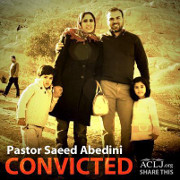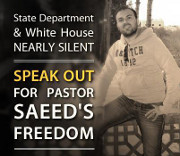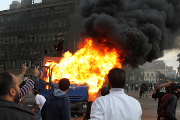Westerners, Koreans, Africans join South Sudanese among those jailed or expelled
By Jeremy Reynalds
Senior Correspondent for ASSIST News Service
 | ||
| Christians worshiping in Sudan. | (Barnabas Fund photo). |
According to a story by Morning Star News, dozens of foreign Christians have been ordered to leave the country in the past two months, and many others have fled to Kenya as authorities have stepped up pressure by denying visa renewals and by other means, the sources said.
The three Christians ordered to leave the country on Jan. 28 had been jailed earlier this month.
Sudan's Ministry of Interior, in conjunction with the National Intelligence and Security Services (NISS), ordered a South Sudanese couple, Anthony and Cecilia Jamu, and a pastor also from South Sudan, Ismail Bashir, to leave the country within 24 hours, sources said.
Morning Star News reported that accused of aiding Sudanese churches, Cecilia Jamu was arrested when she was linked with an associate from Germany, Jasmin Neuman, who was deported on Jan. 7.
For many years Neuman had cared for children in Omdurman (opposite Khartoum on the River Nile) who had taken refuge from conflict in Darfur.
After Cecilia Jamu's arrest, Morning Star News reported the sources said, her husband was also later jailed, leaving their children to be cared for by friends.
The government incarcerated Pastor Bashir also on Jan. 7 for his involvement with a Christian radio station owned by Sudmedia, they said. The government suspected the radio station had ties with a Korean pastor, Kang Bomjin, who along with his wife Sune Kang had been deported on Dec. 10 because of their Christian activities.
Morning Star News said before his deportation, Bomjin owned a farm that Sudan's intelligence service confiscated, forcing him to sell his cows, sheep and other animals at throw-away prices, sources said. The pastor received no compensation for the land.
Another foreign Christian, Ronald Ssemuwemba of Uganda, had been living on Bomjin's land. Also accused of engaging in Christian activities, Sudanese authorities early this month arrested and beat Ssemuwemba after linking him with Christian organizations - confiscating his passport, laptop and cell phone before ordering him to leave the country, sources said.
According to Morning Star News, Ssemuwemba, who had lived in Sudan for five years on a student visa, went into hiding with friends until he was found and deported on Jan. 5.
"The Christian atmosphere in Sudan is alarming and frightening," said a Christian source in Khartoum. "This crackdown at the moment for foreigners who are suspected to be Christians in the country is alarming."
The source, who like the others requested anonymity for security reasons, said the government is declining to renew visas of many foreigners suspected of being Christians.
Morning Star News said Sudan does not allow missionary visas, and those deported were in the country on tourist, work or humanitarian visas. Besides South Sudanese, many of the deported foreigners were from the United States, Europe or South Korea, sources said.
The government of President Omar al-Bashir, who is wanted for crimes against humanity, has reportedly indicated that foreigners will find it more difficult to renew visas, and it has reiterated its policy that all arriving foreigners must register with the immigration department within 24 hours of arrival.
Morning Star News reported a Kenyan government source said that many foreign church workers, especially Western Caucasians, have been leaving Sudan on short notice at a high rate, with most of those going initially to Kenya.
Harassment, violence and arrests of Christians have reportedly intensified since the secession of South Sudan in July 2011, when Bashir vowed to adopt a stricter version of sharia (Islamic law) and recognize only Islamic culture and the Arabic language.
According to Morning Star News, South Sudanese have been ordered to leave the country following the new republic's secession, but thousands are reportedly stranded in the north due to loss of jobs, poverty, transportation limitations and ethnic and tribal conflict in South Sudan.
South Sudanese Christians in Sudan have faced increased hostilities due to their ethnic origins - though thousands have little or no ties to South Sudan - and their faith.
On Dec. 19, Morning Star News said, security forces arrested at least four staff members of Sudmedia, a non-profit company that produces Christian songs and films, and interrogated them because the manager, Nehemiah Lopai, is a South Sudanese national and a Christian. The staff members, whose identities were withheld for security reasons, were released the following day
Security agents on Jan. 3 arrived at the Christian-run Aslan Education Center for English, arrested three staff members and interrogated them about evangelizing Muslims, sources said.
Morning Star News said at least two of them were beaten during interrogation and were warned not to reveal the incident to Western media or churches, sources said. The head of the center, whose identity was not disclosed, had already been arrested and deported to the United States on suspicion of undertaking Christian activities.
Morning Star News said all facilities and assets of the center, which provided English-language instruction to some 500 adults in Khartoum, were confiscated by security agents, including computers and laptops.
Additionally, a primary school in Khartoum run by Aslan Associates, Nile Valley Academy, will close at the end of the academic year in April after the government found it was not teaching Islamic religion - long required by law of all schools in Sudan - and was not separating male and female students.
Sources said NISS, in conjunction with the Ministry of General Education, made the determination to shutter the institution.
Morning Star News said secession has brought other changes. Christians were surprised to find that Christmas was not officially observed as a public holiday in Sudan last month, and church leaders complained that government permission for a Yuletide "March for Jesus" was withdrawn one day after being granted.
"They have denied us Christmas holiday this year for the first time since South Sudan separated in 2011," one source said.
Morning Star News reported the source said government officials stated only that the situation in the country does not allow for such marches.
"They banned the march in the last minute after all arrangements were met," the source added.
For more information go to http://morningstarnews.org
.jpg)





.jpg)


